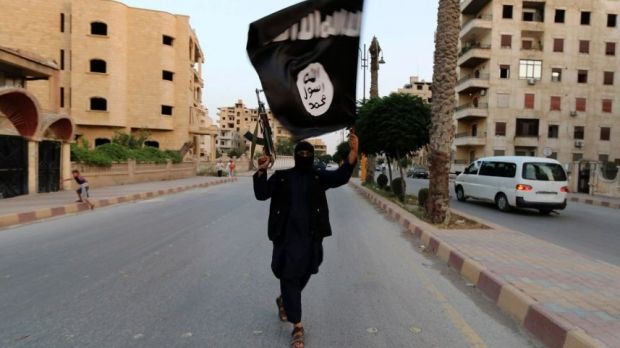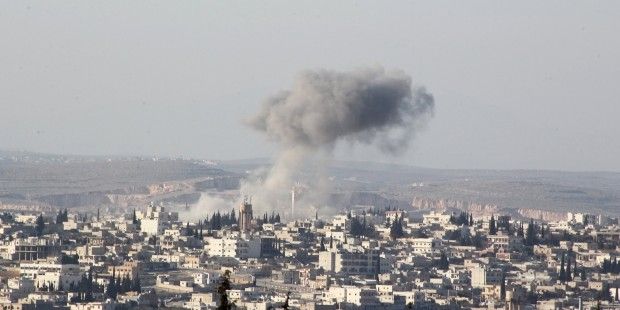
This week, Kurdish forces pushed the terror group out of two cities —al Thawrah and Ash Shaddadi—that sit on supply routes for ISIS's de facto Syrian capital, Raqqa. In Ash Shaddadi, Kurdish forces received substantial U.S.-led coalition air strike support, Nancy Youssef wrote in her article published by the Daily Beast.
At the same time, ISIS appears to be making strides toward taking new cities in western Syria. The terror group has aggressively fended off a months long Russian-led defense of the central city of Palmyra, a city that many believe could serve as ISIS's entrée into western Syria. And ISIS claimed responsibility for a series of deadly bombings Sunday in the city of Homs and the southern outskirts of Damascus that killed at least 200 people, potentially signaling its move on those cities, according to the report.
Is ISIS trying to broaden its area of control to make fighting harder for both Russian and U.S. backed forces? Or is it losing ground around its capital and looking for any city in Syria where it can grow?
Defense officials are cautiously hopeful that it's the latter, noting that the number of ISIS fighters continues to fall. The latest Pentagon estimate is that the terror group’s ranks stand at 15,000, the lowest of the war, the article reads.
"They are shifting the fight toward territory that is fruitful," one defense official explained to The Daily Beast. "They more we show they are indeed not a state the more we are undermining their narrative."
On the other hand, it is noted that if ISIS gains more territory in Syria, even with fewer fighters and in the face of thousands of coalition strikes, it would solidify the group’s grip on that country. Moreover, such gains would stretch the Russian and coalition forces' air campaign against them.
Should ISIS win Palmyra and Homs, for example, it would put it far closer to parts of Syria still under control of Syrian President Bashar al-Assad. Russia would be then forced to expand its war over every corner of the county, and the already stretched U.S. coalition would be hard pressed to fight ISIS on so many fronts.

Either way, recent fighting has marked one of the most dramatic shift for the group's territorial hold in months.
ISIS appears to have calculated that it would rather take on Syrian Army ground forces, backed by Russian airstrikes, than Kurdish forces backed by U.S.-led forces, defense officials and watchers of the conflict have concluded.
"ISIS is prioritizing fighting the Syrian regime over Kurdish forces. We are at beginning of that trend," said Jennifer Cafarella, a fellow at the Washington, D.C.-based Institute for the Study of War, who studies the Syrian conflict.
"They are ceding territory in the north while consolidating in central Syria and positioning themselves in the west," she said.
Yet, no one at the Pentagon is willing to openly celebrate. ISIS has been strategically savvy throughout the war, while the U.S. has made several pronouncements that ended up being miscalculations about the group—and how to fight it. What the Pentagon sees as ISIS carrying out a new strategy could instead be ISIS grasping for any land it can.
Moreover, while ISIS has lost ground in central Syria, it conducted more strikes overall since the Russian strike campaign began last fall, according to at least one estimate.
It is reported that on Wednesday, ISIS reportedly escalated its campaign in the city of Khanaser, near Aleppo, despite Russian airstrikes, cutting off a Syrian Army supply route.
Most importantly, it is not clear how much danger Raqqa is of falling out of ISIS hands, even with the loss of supply lines. That ISIS did not fight aggressively for those cities suggests that maybe it didn't need the supply lines as much as fighters had anticipated. And there is no indication that the Kurds are willing to fight for the Arab-dominated city. Rather, Kurdish fighters appear motivated to take cities near Raqqa where Kurds live.
"ISIS is in trouble. It's a question of how much trouble they are in and how resilient they are," said Daveed Gartenstein-Ross, a senior fellow at the Washington, D.C.-based Foundation for Defense of Democracies.
The U.S. and Russia agreed Monday to a partial truce in Syria that takes effect Saturday, giving both Russia and the U.S. days still to strike the terror group and potentially shift the landscape of the war yet again.

